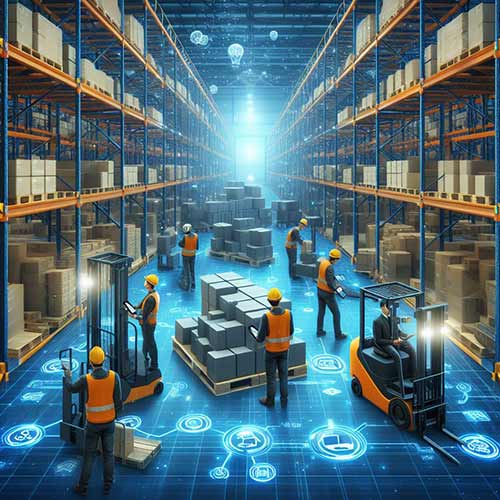In recent years, blockchain technology has emerged as a transformative force across various industries, revolutionizing processes, enhancing security, and improving efficiency. While commonly associated with cryptocurrencies, blockchain’s potential extends far beyond finance, with significant implications for material handling industries. Let’s explore how blockchain technologies can be utilized by these industries to drive innovation and streamline operations.
- Enhanced Supply Chain Management: Blockchain’s decentralized and immutable nature makes it ideal for supply chain management in material handling industries. By leveraging blockchain, companies can create transparent, traceable supply chains, enabling real-time tracking of products from raw materials to the end consumer. This transparency helps in reducing fraud, counterfeiting, and unauthorized modifications, ensuring the integrity of the supply chain.
- Smart Contracts for Automated Transactions: Smart contracts, self-executing contracts with predefined rules written in code, can automate and streamline various processes within material handling. For instance, smart contracts can facilitate automated payments upon delivery of goods, optimize inventory management, and manage contracts with suppliers and logistics partners. This automation reduces paperwork, minimizes errors, and enhances efficiency throughout the supply chain.
- Asset Tracking and Management: Blockchain technology can revolutionize asset tracking and management in material handling industries. By utilizing blockchain-based platforms, companies can securely record and track the ownership, maintenance history, and location of assets such as equipment, vehicles, and inventory. This real-time visibility improves asset utilization, reduces downtime, and enhances overall operational efficiency.
- Improved Data Security and Authentication: Data security is paramount in material handling industries, especially when dealing with sensitive information such as customer data, supply chain data, and financial transactions. Blockchain’s cryptographic algorithms and decentralized architecture provide enhanced security by protecting data integrity, preventing unauthorized access, and enabling secure authentication and identity management.
- Supply Chain Transparency and Compliance: Blockchain technology facilitates greater transparency and compliance within material handling supply chains. By recording transactions and data on a tamper-proof blockchain ledger, companies can demonstrate compliance with regulations, industry standards, and sustainability initiatives. This transparency also fosters trust among stakeholders, including customers, partners, and regulatory bodies.
- Streamlined Cross-Border Transactions: For material handling industries involved in international trade and logistics, blockchain can simplify cross-border transactions and documentation processes. Blockchain-based platforms can facilitate faster, more secure, and cost-effective international payments, reduce paperwork and delays associated with customs clearance, and ensure regulatory compliance across borders.
- Decentralized Marketplaces and Procurement: Blockchain enables the creation of decentralized marketplaces and procurement platforms, connecting buyers and suppliers directly without the need for intermediaries. This disintermediation reduces costs, eliminates inefficiencies, and enables more transparent and efficient procurement processes within material handling industries.
In conclusion, blockchain technology offers immense potential for transforming material handling industries by enhancing supply chain management, automating transactions, improving asset tracking, ensuring data security, promoting transparency, and streamlining cross-border operations. As companies embrace blockchain solutions, they can unlock new levels of efficiency, innovation, and competitiveness in the dynamic landscape of material handling
Explore More:

